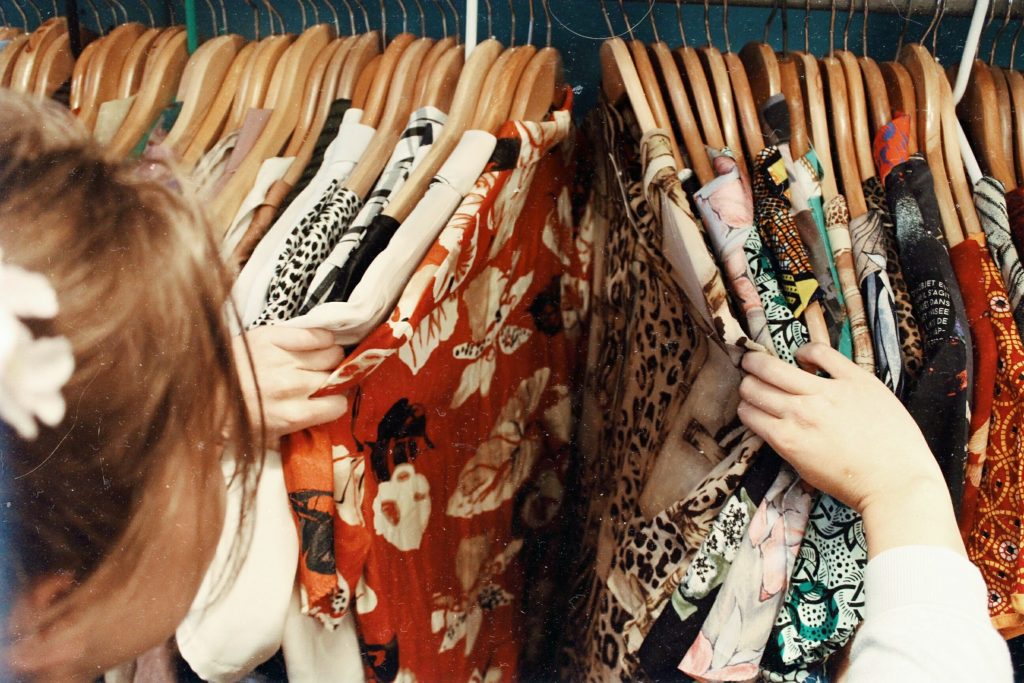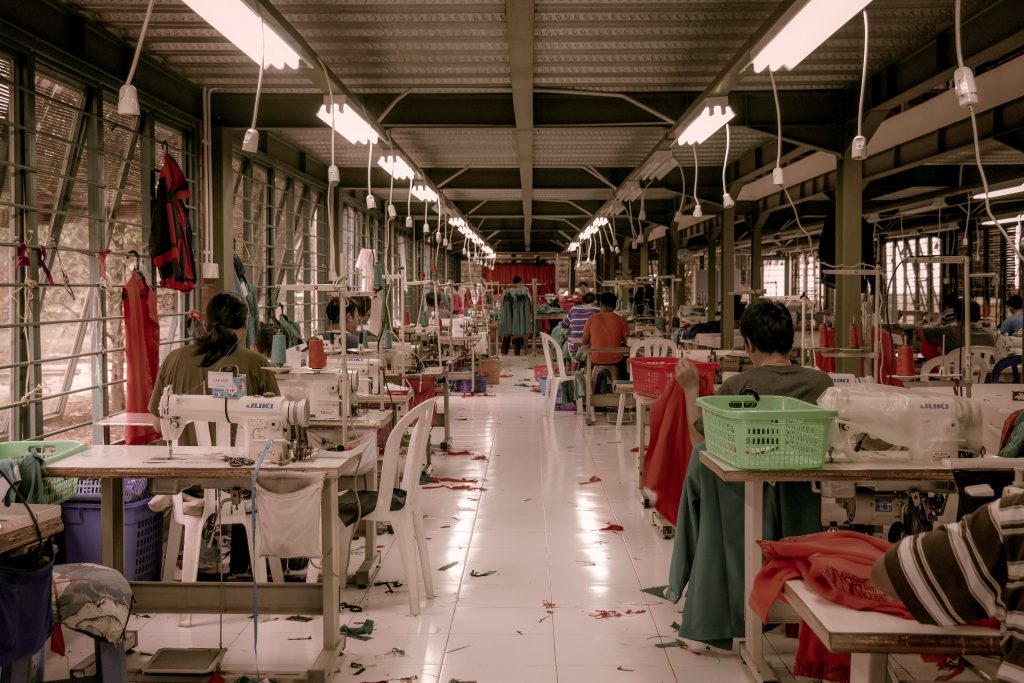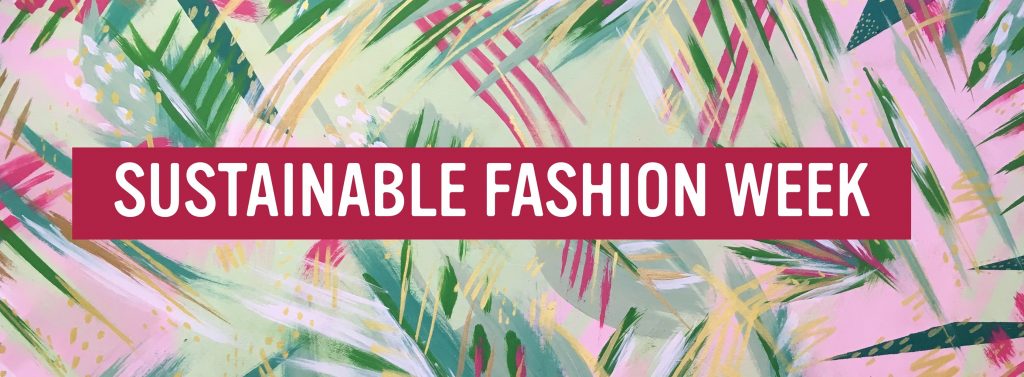


Guest blog by Amber Rochette, Sustainable Fashion Week

With much of its purpose being part of current, fast-moving trends- fashion is inextricably woven with time. Perhaps more so than any other industry, with many of its processes being traced back centuries; with technological innovations for cotton production beginning in the 18th century. Fashion is relative to absolutely everybody on the planet, and life would be unimaginable without clothes. This seems especially so within the UK, being a nation that buys more clothes per person than any other country in Europe.
The burgeoning textile consumption within the UK is responsible for a growing carbon footprint of roughly 26.2 million tonnes per year; which could equate to a quarter of the global carbon budget if consumption continues to proliferate at this rate. ‘Fast Fashion’ is widely understood as low-cost, quick turn-around collections based on luxury trends that encourages disposability. The rise of fast fashion over the past decade, has further exacerbated the many negative environmental impacts caused by clothing production.
Our constant desire for the newest trends means that cable to sit currently stands CO2 emissions are expected to increase by over 60% by 2030 as a direct result of the emissions caused by the industry; which is a real worry at a time when the government has committed to becoming net-zero by 2050 under the Climate Change Act 2008.
This, coupled with a number of environmental and social environmental disasters directly related to the industry such as the Rana Plazavi and the disappearance of the Aral Sea, vii has meant that many wider stakeholders in the industry have started to become aware of the negative environmental impacts the industry can have. environmental As such, pressure from consumers and NGO groups for a more sustainable industry is increasing.viii, in a collective effort to meet the net-zero commitments.
Some big companies are already showing commitments to slower business models. For example, in light of the recent COVID-19 pandemic, Gucci announced they are cutting down from five shows to just two, seasonless shows a year – showing hope for greener, less wasteful trends to follow suit. Even if we as consumers each make more conscious decisions to shop less, the question as to whether this alone is enough to allow the industry to turn the tide still remains.
Creating such a big change requires concrete action from everyone: companies, society and the government too. Under the Companies Act 2006, it is a legal requirement for directors to act in the best interests of the company’s shareholders. Whilst the duty remains to promoting the fiduciary success of the company, its often seen the environment (as a wider stakeholder) is forgotten about.
A decade later, the act was amended to include nonfinancial reporting requirements. This was added to ensure that companies’ environmental, social and governance (ESG) factors were accessible. The act criminalises failure to adhere to non-financial reporting requirements. However, the ‘comply or explain’ approach that it adopts simply weakens any scope for liability. ‘Comply or explain’ is a distinct feature of the UK corporate governance code, having been put into place to avoid companies ticking boxes and encourage clear rationale behind their reporting actions.
The act states that a clear and reasoned explanation for failing to report on ESG factors is required, however there is no definition or explanation as to what this may constitute – so is unregulated in this regard meaning many companies are avoiding criminal liability. Some argue that this approach is creating a large gap between sustainability reporting, and sustainability in action, which can give rise to the opportunity of greenwashing.
It can be very difficult for companies to balance the needs of their shareholders, whilst still being socially and environmentally responsible – especially so in an industry that is so heavily reliant on carbon emissions and natural resources worldwide. A report from the All-Party Parliamentary Group for Ethics and Sustainability in Fashion in September 2020, has indicated that the government needs to invest in the fashion industry to help stimulate economic growth in the UK and encourage a green COVID-19-recovery.
This goes to show that the government does to have a key role to play in helping fashion become more sustainable, with clearer guidance and more investment opportunities perhaps it can help steer the industry into a slower, more sustainable pace. Sustainable Fashion is at a pivotal moment. Given how each of us get dressed every day and we all share the same planet of which climate change is affecting – it’s safe to say that action is required from everyone to help stop fashion from pushing us into runway climate change (pun intended). Any action big or small will help, so here a few things that we as consumers can do:
- Try and shop less – the most sustainable piece of clothing is the one you have in your wardrobe!
- Don’t be a victim of greenwashing – check labels and green claims are certified. GOTS is a really good place to start.
- Re-use and re-purpose clothes you already have – join a community clothes swap or learn new sewing skills.
- Sign petitions – the parliament website has thousands of petitions to sign and any with over 10,000 signatures will get a response from the government. Change.org is also a really good place to look through.
- Support NGO groups who are lobbying for change – The Fashion Revolution, Greenpeace, Labour Behind the Label, and Traid are a good place to start.
- Write to your local MP and let them know about this problem – a list local of MPs can be found on the government website.
Be a part of the change at Sustainable Fashion Week 2021
This year’s Sustainable Fashion Week (11-19th September 2021) will see organisations, industry experts, consumers and activists come together to empower, upskill and inspire the community and help generate ‘action from the ground up’. The event will also celebrate the many ways we can begin new fashion habits that don’t harm people or planet, with the ultimate core aims being ‘changing the story’ and ‘cultivating inclusivity’.
Find out more about the Sutainable Fashion Week 2021 programme.

Amber Rochette is Partnerships Manager with Sustainable Fashion Week. She is currently studying a Masters in Environmental Law and Sustainable Development. In the future, she hopes to find work in the fashion industry, helping to create a meaningful shift in societal behaviour and helping to shape consumer behaviour in terms of their relationships with clothing. Sustainable Fashion Week is scheduled to take place 11-19th September, 2021.




